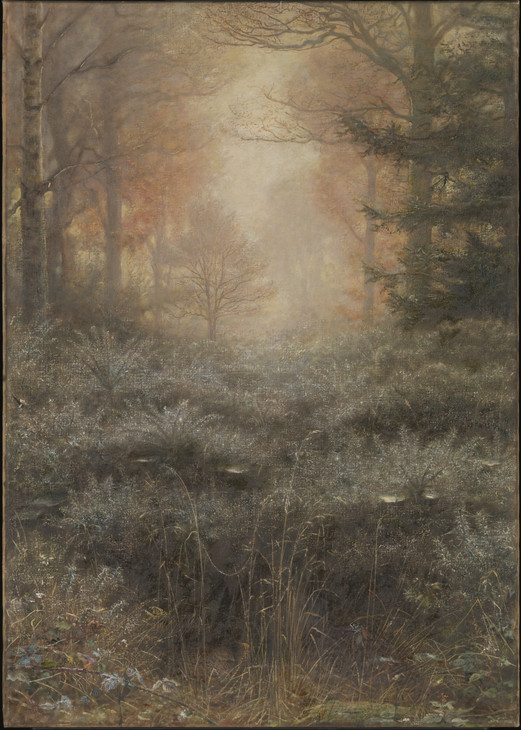Sir John Everett Millais, Bt Dew-Drenched Furze 1889–90

Sir John Everett Millais, Bt 1829–1896
Dew-Drenched Furze 1889–90
Oil paint on canvas
support: 1732 x 1230 x 27 mm
Tate T12865
Presented by Geoffroy Millais in memory of his late father, Sir Ralph Millais Bt 2009
Sir John Everett Millais, Bt 1829–1896
Dew-Drenched Furze 1889–90
Oil paint on canvas
support: 1732 x 1230 x 27 mm
Tate T12865
Presented by Geoffroy Millais in memory of his late father, Sir Ralph Millais Bt 2009
This late landscape is a visionary evocation of nature. Within a symmetrical composition and vertical format, light filters through the trees. According to his son J.G. Millais, Millais’s inspiration was ‘the potent voice of the wood spirits’. Millais’s title comes from Tennyson’s In Memoriam A.H.H., 1850, written in response to the early death of the poet’s friend Arthur Hallam. Millais may also have shared Tennyson’s opinion that, though a work may be inspired by personal experience, its emotions are universal: ‘“I” is not always the author speaking of himself, but the voice of the human race speaking through him.’
From Alfred Tennyson, In Memoriam A.H.H., XI, 1850
Calm is the morn without a sound,
Calm as to suit a calmer grief,
And only thro’ the faded leaf
The chestnut pattering to the ground:
From Alfred Tennyson, In Memoriam A.H.H., XI, 1850
Calm is the morn without a sound,
Calm as to suit a calmer grief,
And only thro’ the faded leaf
The chestnut pattering to the ground:
Calm and deep peace on this high wold,
And on these dews that drench the furze,
And all the silvery gossamers
That twinkle into green and gold:
And on these dews that drench the furze,
And all the silvery gossamers
That twinkle into green and gold:
Calm and still light on yon great plain
That sweeps with all its autumn bowers,
And crowded farms and lessening towers,
To mingle with the bounding main:
That sweeps with all its autumn bowers,
And crowded farms and lessening towers,
To mingle with the bounding main:
Calm and deep peace in this wide air,
These leaves that redden to the fall;
And in my heart, if calm at all,
If any calm, a calm despair:
These leaves that redden to the fall;
And in my heart, if calm at all,
If any calm, a calm despair:
Calm on the seas, and silver sleep,
And waves that sway themselves in rest,
And dead calm in that noble breast
Which heaves but with the heaving deep.
And waves that sway themselves in rest,
And dead calm in that noble breast
Which heaves but with the heaving deep.
How to cite
Sir John Everett Millais, Bt, Dew-Drenched Furze 1889-90, in Nigel Llewellyn and Christine Riding (eds.), The Art of the Sublime, Tate Research Publication, January 2013, https://www
